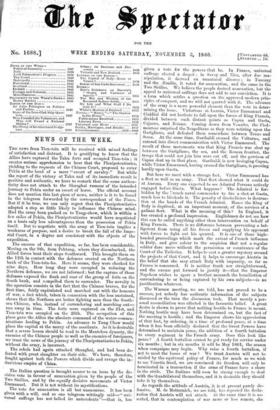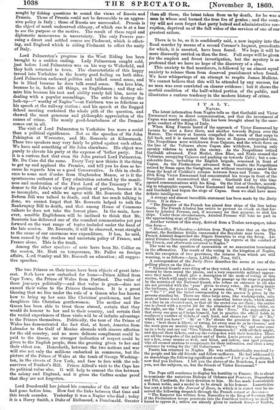The Italian question is brought nearer to an issue by
the de- cisive vote in favour of annexation given by the people of the Two Sicilies, and by the equally decisive movements of Victor Emmanuel. But it is not without its mystifications. The vote for annexation is all but unammbus. It has been given with a will, and as one telegram wittingly said—" uni- versal suffrage has not belied its antecedents "—that is, has given a vote for the powers that be. In France, universal too suffrage elected a despot ; in Savoy and Nice, after due ma- nipulation, it decreed an unnatural divorce ; in Tuscany and the ../Emilia, it voted for annexation, and the same in the Two Sicilies. We believe the people desired annexation, but the appeal to universal suffrage does not add to our conviction. It is a form which settles a question on the approved modern prin- ciples of conquest, and we will not quarrel with it. The advance of the army is a more powerful element than the vote in deter- mining the issue. 'Victorious at Isernia, Victor Emmanuel and Cialdini did not hesitate to fall upon the forces of King Francis, divided between such distant points as Capua and Gaeta, Cajazzo, and Boiano. Coming down from Venafro, the Pied- montese surprised the Neapolitans as they were retiring upon the Garigliano, and defeated them somewhere between Teano and Sessa. At the same time, Garibaldi crossed the Volturno, and entered into direct communication with Victor Emmanuel. The result of these movements was that King Francis was shut up between the Garigliano, the sea, and the Roman frontier, the troops that could not join him were cut off, and the garrison of Capua shut up in that place. Garibaldi is now besieging Capua, while Victor Emmanuel, having crossed the Garigliano, is pressing hardly upon Gaeta.
But here we meet with a strange fact. Victor Emmanuel has a fleet as well as an army. That fleet showed what it could do at Ancona. Every one expected to see Admiral Persano actively engaged before Gaeta. What happens ? The Admiral is for- bidden by the 7reuch naval commander to fire a shot at Gaeta, much less to blockade it. The penalty of disobedience is destruc- tion at the hands of the French Admiral. Hence the King of Italy is deprived, at an important moment, of the services of a gallant fleet. What is Ole meaning of this ? In England, it has created a profound impression. Englishmen do not see how this can be called anything other than intervention on behalf of King Francis. There is no difference between preventing a bel- ligerent from using all his forces and supplying his opponent with forces to fight out his quarrel. It is one of those high- handed proceedings which mark the extent of French influence in Italy, and give colour to the suspicion that not a regular soldier dare move without the permission or connivance of the Court of the Tuileries. It helps to cast a greater mystery around the projects of that Court, and it helps to encourage Austria in the belief that she may attack Italy with impunity, so far as France is concerned. It is neither frank nor straightforward, and the excuse put forward to justify it—that the Emperor Napoleon wishes to spare a brother monarch the humiliation of surrendering to or being captured by his own subjects—is no justification whatever.
The Warsaw meeting, we arc told, has not proved to be a success, yet nobody has authentic information of the subjects discussed or the turn the discussion took. That merely a per- sonal reconciliation was effected is the favourite belief. I great desire is shown to prove that nothing hostile to France is meant. Nothing hostile may have been determined on, but the fact of the meeting is hostile ; and the Emperor shows his appreciation of that fact, by ordering, in a time of profound peace, at a time when it has been officially declared that the Great Powers have determined to maintain peace, the addition of a fourth battalion to every regiment in the French army. Does this look like peace ? A fourth battalion cannot be got ready for service under six months ; but in six months it will be May 1861, the season when campaigns may begin. Why raise a fourth battalion, if not to meet the losses of war ? We trust Austria will not be misled by the equivocal policy of France, for much as we wish to see Venetia freed, we are convinced its freedom will only be terminated in a transaction if the arms of France have a share in the strife. The Italians will soon be strong enough to deal with the Quadrilateral, themselves, and it is desirable they should take it by themselves. As regards the attitude of Austria, it is at present purely de- fensive. M. de Metternich, we are told, has repeated the decla- ration that Austria will not attack. At the same time it is as- serted, that in contemplation of war more or less remote, she
sought by fishing questions to sound the views of Russia and Prussia. Those of Prussia could not be favourable to an aggres- sive policy in Italy ; those of Russia are unrevealed. Prussia is the object of much undeserved obloquy, of which one is at a loss to see the purpose or the motive. The result of these regal and diplomatic manoeuvres is uncertainty. The only Powers pur- suing a direct and settled course are Piedmont, which is effect- ing, and England which is aiding Piedmont to effect the unity of Italy.



























